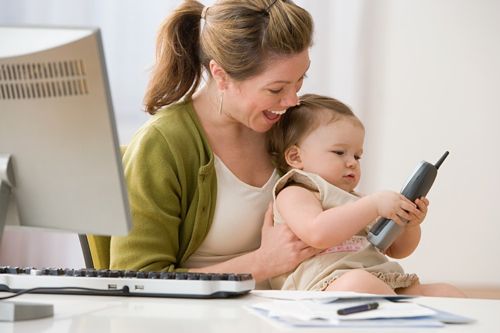Would you encourage your baby to use your smartphone?

Smartphones and tablets are everywhere. And children are using them more and more often.
Users of one of the largest baby information sites in the UK, Babies.co.uk, responded to a poll on how much they allow their babies to play with their smartphone or tablet device. The results show that a significant amount of parents give their babies smartphones and tablets to "help them learn".

But 69 percent of parents feel that smartphone use could disconnect their children from a relationship with their parents.
More than half of parents admitted that they allow their baby to play with their phone or tablet device, and 14 percent of parents confessed to doing so for more than 4 hours every day.
"Given that babies between three to 12 months are awake for only around 10 hours per day, this is a huge proportion of their waking day," said James Macfarlane, managing director of Babies.co.uk.
"Although 81 percent of our users felt that children today spend too much time on smart devices, it has not put most of them off using them to entertain their baby," said Macfarlane.
"The real problem with babies playing with smart devices is what it leads to in the future"
— James Macfarlane, managing director, Babies.co.uk
"At what age will we teach them to sit patiently at the table in a restaurant, to make conversation with other people, or to simply cope with being bored in everyday situations without producing our smartphone for them?"
The survey results show that 55 percent of respondents said that they allowed their baby to use their device. What stands out in the survey results is that people are not confident that this form of entertainment is actually good for their child.
Whilst 50 percent of people felt than it could be educational, 69 percent of those questioned felt that too much play on a tablet or smartphone would, or might, disconnect their baby's relationship with them.
"It's clear that the convenience of these devices is winning over parents, even some of those who think it might not be good for their child's development," said Macfarlane.
"Tablets are helpful to parents in many situations, but it is their instantaneous effect that is probably their downfall," he said. "Once you establish them as an easy means of entertainment for your child, it becomes hard to draw the line on when to take it away."
Fifty percent of respondents said that they felt babies could learn from using these technologies, but advice suggests caution with this idea. Macfarlane reckons that it is "easier for us to justify our babies using smartphones and tablets if we feel they are learning something from it".
"But for them to get the most out of a smartphone app, you need to be involved, too — talking about what they're looking at, and helping them to understand the point of what they're doing."
Caution is also recommended where mobile devices might be substituting play that could be more beneficial for a baby's development.
Babies could be exploring their surroundings, interacting with their parents, or learning to move.
Dr Carolyn Jaynes, learning designer for Leapfrog Enterprises, said that children under two years of age learn best from real-world experiences and interactions.
"Each minute spent in front of a screen-based device is a minute when your child is not exploring the world and using their senses, which is extremely important in their development process."
But parents, desperate to quieten a fractious child, might take the easier, digital way out for peace and quiet.